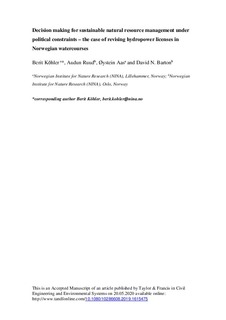Decision making for sustainable natural resource management under political constraints – the case of revising hydropower licenses in Norwegian watercourses
Journal article, Peer reviewed
Accepted version

Åpne
Permanent lenke
http://hdl.handle.net/11250/2603562Utgivelsesdato
2019Metadata
Vis full innførselSamlinger
- Publikasjoner fra CRIStin - NINA [2364]
- Scientific publications [1392]
Originalversjon
10.1080/10286608.2019.1615475Sammendrag
Norway is the largest hydropower producer in Europe and provides currently 96% of domestic electricity supplies. Hydropower is a renewable and climate friendly source of energy, but causes an impairment on local environmental conditions, recreational use and aesthetics in and along impacted watercourses and lakes. Around 70% of the larger Norwegian watercourses and half of the country`s total water-covered areas are regulated for hydropower production. By 2022, up to 430 hydropower licences will come up for revisions to implement the European Water Framework Directive in Norway. These have considerable potential to increase environmental and aesthetic conditions in Norwegian watercourses. We examine the decision-making of five completed licence revisions by means of document analyses of all relevant written sources, showing the content, methods and procedural qualities of the revision process. Despite case-specific differences, there are significant commonalities which form the basis for recommendations. Multi-criteria decision analysis (MCDA) can be used to improve the documentation of physical impacts and value judgements in hydropower decision-making processes. We analyse the perception of main interest groups with regards to the use of MCDA in future revisions. There exists a rather strong resistance to using MCDA due to a variety of political and regulatory reasons. Hydropower; integrated water resource management; environmental conditions of watercourses; recreational and aesthetic interests; qualitative social research; multi-criteria decision analysis (MCDA)